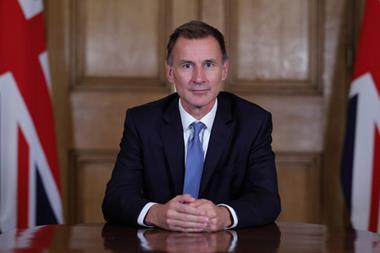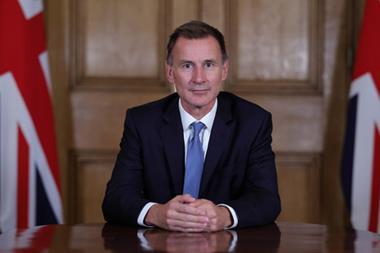The UK pensions industry has welcomed plans by Jeremy Hunt, chancellor of the exchequer, to make it easier for well-funded defined benefit (DB) schemes to run on and build surpluses.
The plans were not mentioned in ins Autumn Statement speech yesterday, but were included in supporting documents.
The proposed measures include:
- consulting this winter on whether changes to rules around when DB scheme surpluses can be repaid, including new mechanisms to protect members, could incentivise investment by well-funded schemes in assets with higher returns;
- reducing the authorised surplus payments charge from 35% to 25% from 6 April 2024.
Alex Beecraft, partner at Aon, said the announcement was a “landmark moment” for the DB pensions industry which reflected the improved funding situation facing many schemes.
“If enacted, new flexibilities on recovering surplus could make it easier for sponsors to obtain a refund on the significant contributions made over the last decade, while preserving ongoing member experience and benefit flexibility,” he said.
Key to this, Beecraft said, will be testing the strength of its sponsor, capital strategy and governance arrangements to show that pensions will remain secure outside of insurance.
Steve Webb, partner at LCP, said the chancellor’s plans to make it easier for well-funded DB schemes to run on and build a surplus are a ‘huge leap forward’.
“Provided that member benefits are protected, schemes would be able to build up surplus funds, benefiting existing members, the next generation of pension savers and the sponsoring employer,” he noted.
He said that rather than “wasting” the potential of over £1trn of assets which have been “painstakingly built up over decades”, this new regime would be a “win for members and sponsors alike”.
He added that the announcement of a lower rate of tax on extracted surpluses is a clear sign that the Treasury is serious about these plans.
“We look forward to seeing the consultation on the details of how this new regime will work and encourage all well-funded schemes to include the option of running on when deciding on their end game strategy,” Webb said.
Elaine Torry, partner at Hymans Robertson, agreed that tax incentives are one tool that could help to align DB scheme choices with society’s wider aims.
However, she said that incentives to extract surplus would only be effective as part of a broader reframing of objectives for DB schemes.
She said: “Using surplus to fund pension costs may simply free up business cash for other uses, so the government needs to implement tax incentives in a way that they end up creating value and help the wider economy.”
Nicholas Clapp, business development director at TPR Retirement Solutions, added that the proposals to make it easier to access scheme surpluses could be “hugely beneficial” and releasing this capital for business investment could fuel economic growth.
He said the reforms create an incentive for schemes to run on, serving as an alternative solution to an insurer buyout. “This could benefit trustees, sponsors and pension scheme members by providing more endgame options.”
Consultation
This follows a consultation into options for DB schemes launched in July by the chancellor which sought views on how DB schemes could increase the amount invested in productive asset classes. This included exploring whether the government should do more to support DB schemes’ ability to invest in productive finance and what is the evidence with respect to building and extracting surplus.
On what could incentivise more trustees and sponsors to invest in productive finance, a significant number of respondents suggested changes to the taxation of authorised surplus repayments could incentivise trustees to extract surplus from DB schemes. Respondents also suggested reforms to valuation methods and reinstatement of tax relief on UK dividends would be effective in this respect.
On impact of extracting surplus, DWP received mixed views. Respondents noted that additional flexibilities would likely lead to riskier investment strategies, while noting that investment would not necessarily be in UK assets. Respondents suggested that trustees’ fiduciary duties should lead them to consider investments on a global basis.
Respondents indicated that even if schemes were incentivised to re-risk, increased investment in UK productive finance would not necessarily follow on the basis that productive investments are complex and would be challenging for many schemes to invest in.
Respondents also expressed doubt as to the impact on productive finance allocations from many schemes on the basis of the small size and lack of relevant investment experience within DB schemes.
There were also concerns about 100% Pension Protection Fund (PPF) underpin suggested by the consultation. A large number of respondents questioned the feasibility and moral hazard implications of an opt-in regime whereby schemes elected to pay a higher levy in return for 100% benefit protection by the PPF.
Respondents highlighted a number of concerns, including doubts around take-up by schemes and potential impacts on existing PPF levy payers and members. Responses also raised the issue of fairness between current and future PPF members, suggesting that greater PPF guarantees might lead to increased levies across the board, causing significant impacts on small DB schemes.
Next steps
The DWP is planning to launch a public consultation to consider the detail of measures to make surplus extraction easier, including design, eligibility, safeguards, and the viability of a 100% PPF underpin. It added that it will establish a public sector consolidator by 2026 focusing on schemes that are unattractive to commercial providers.
Read the digital edition of IPE’s latest magazine























